Module 11 Way of life模块导学课件
文档属性
| 名称 | Module 11 Way of life模块导学课件 | 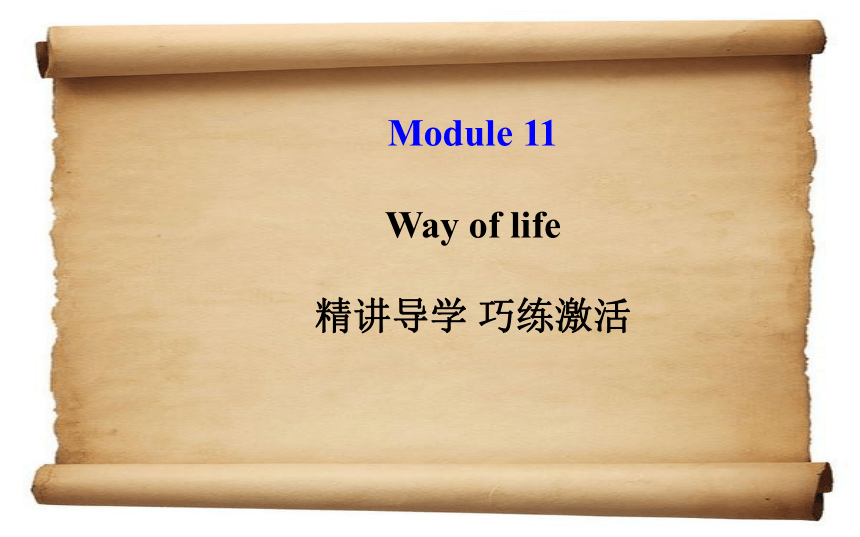 | |
| 格式 | zip | ||
| 文件大小 | 2.7MB | ||
| 资源类型 | 教案 | ||
| 版本资源 | 外研版 | ||
| 科目 | 英语 | ||
| 更新时间 | 2014-11-22 02:55:41 | ||
图片预览

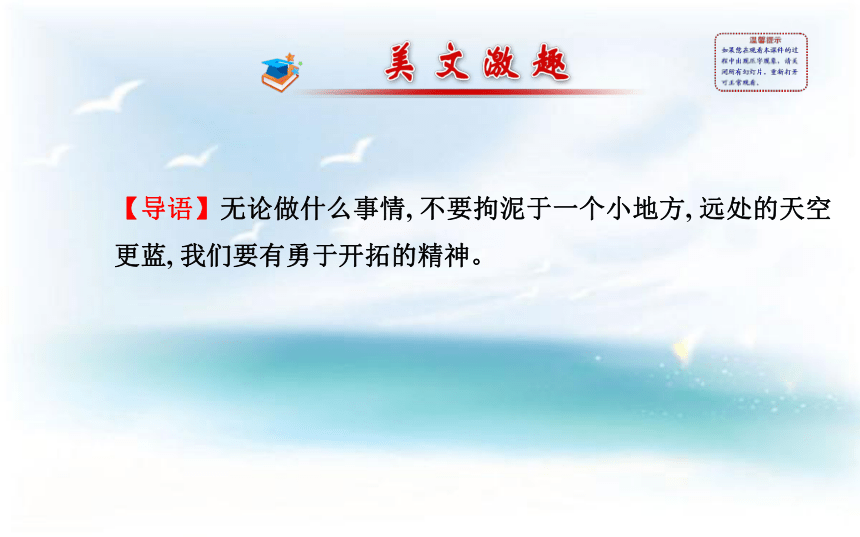
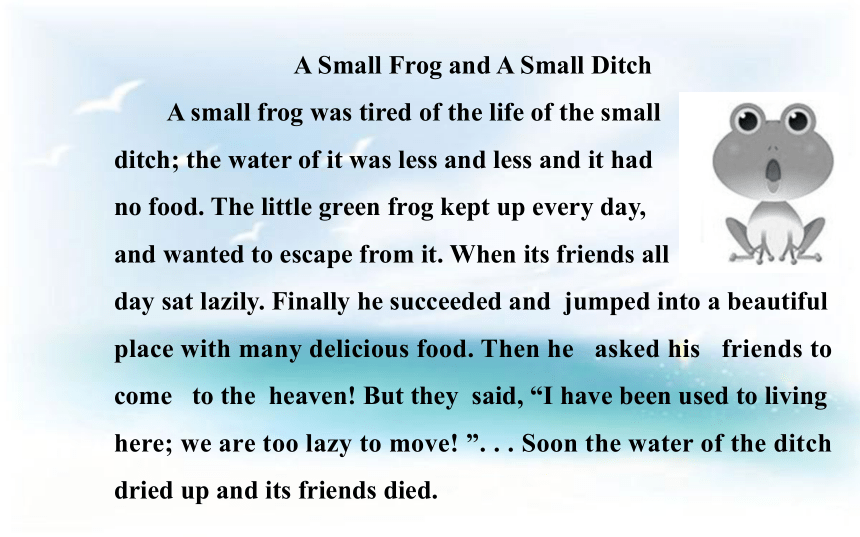
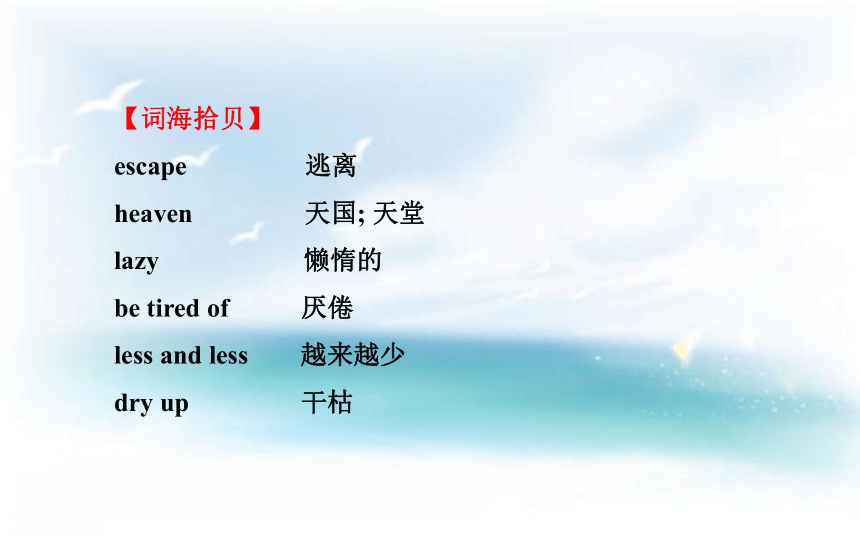
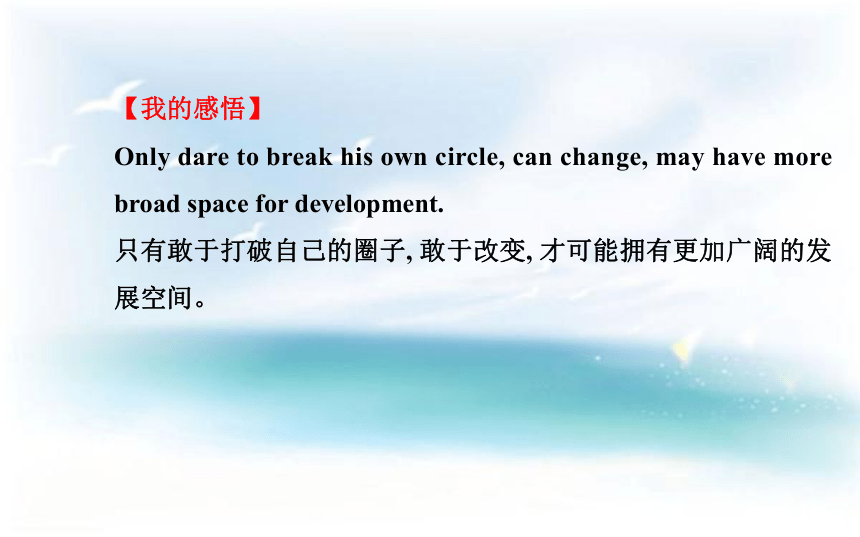
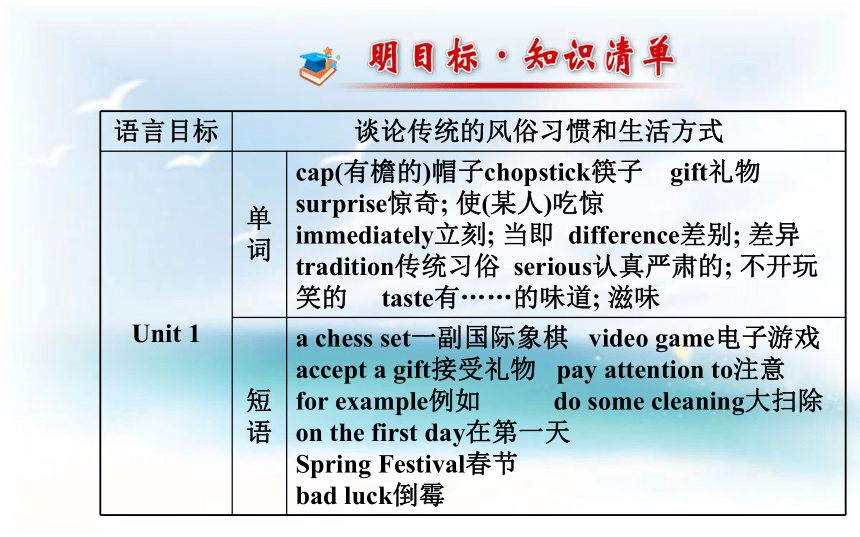
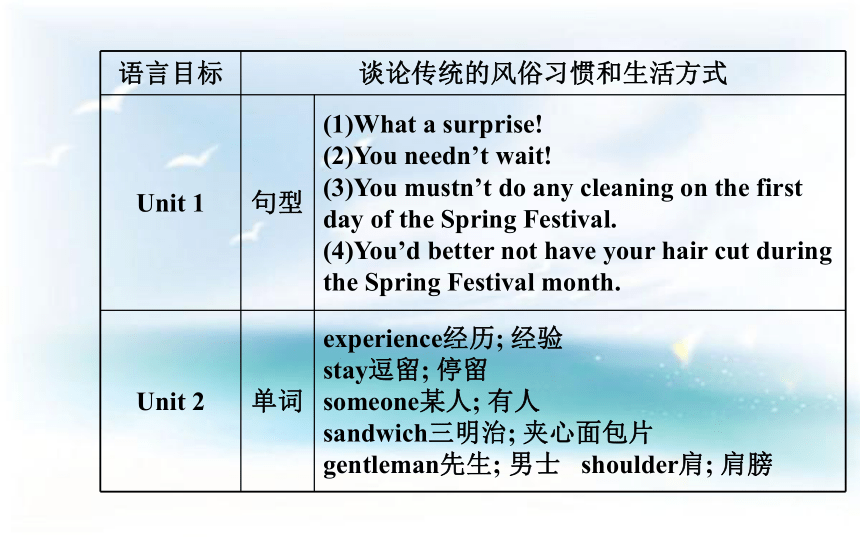
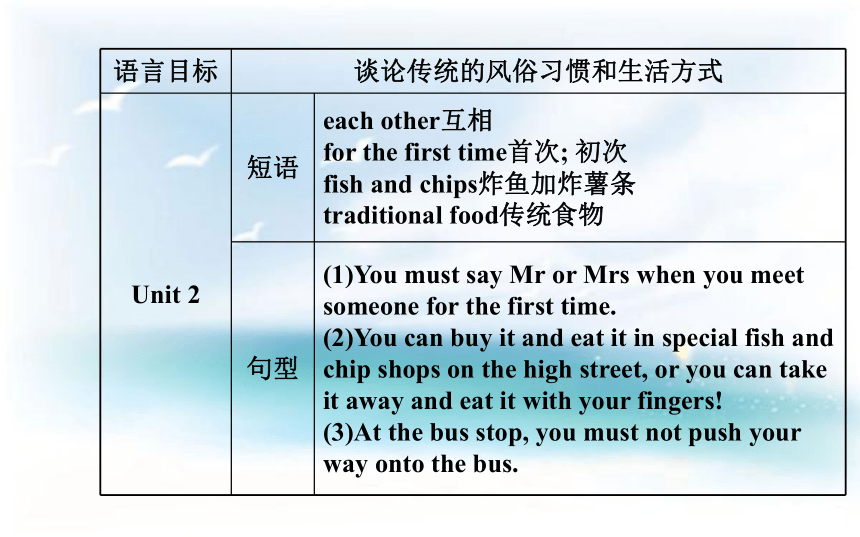
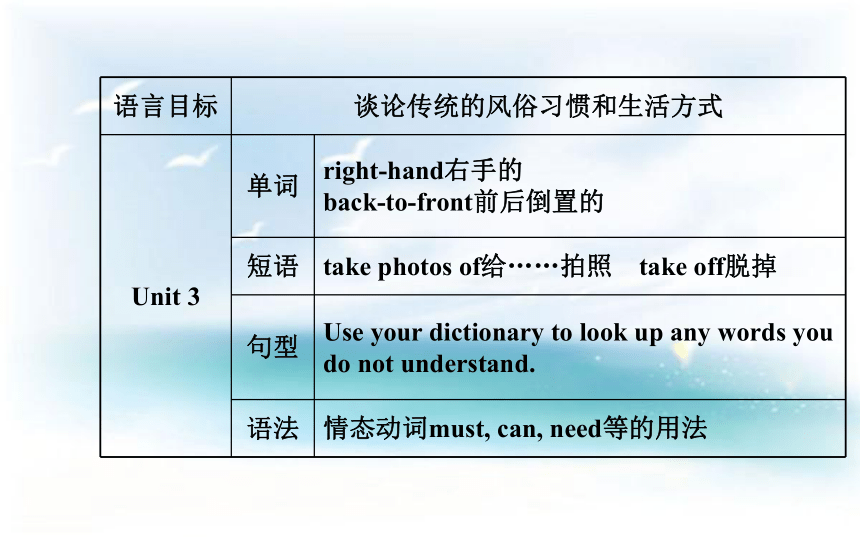
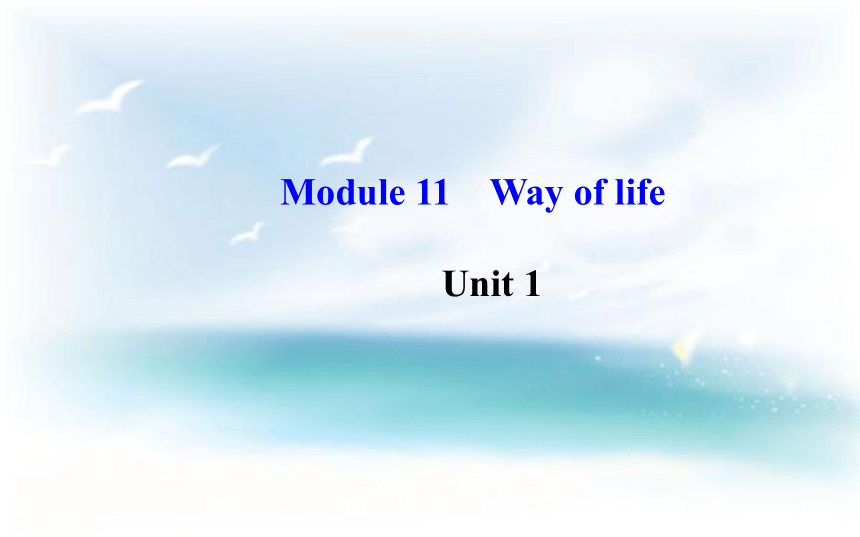
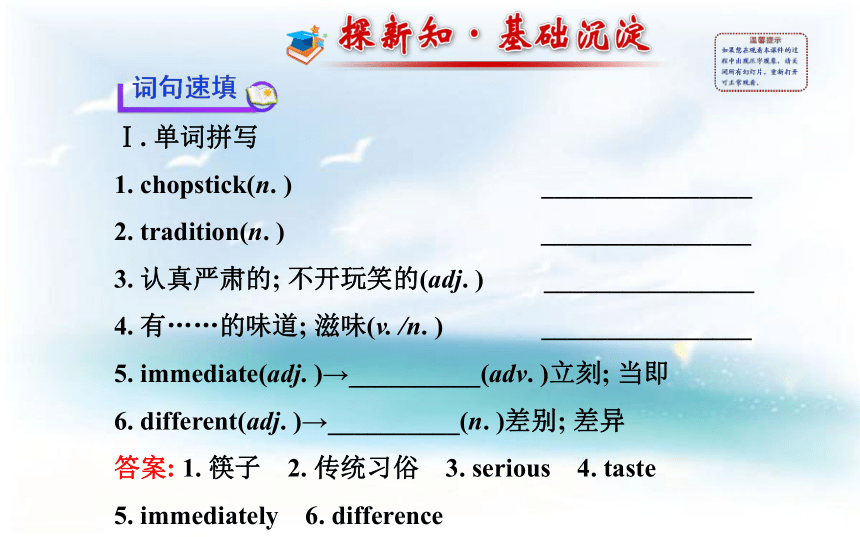
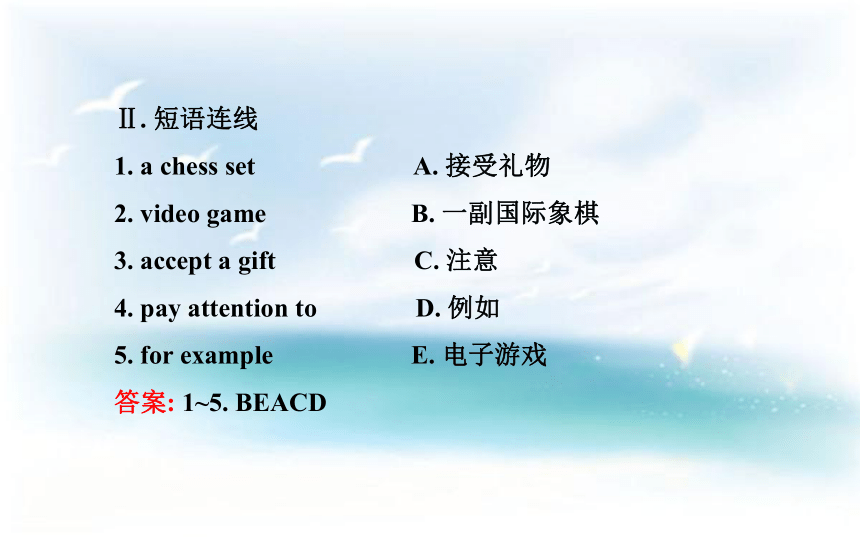
文档简介
课件96张PPT。Module 11
Way of life
精讲导学 巧练激活【导语】无论做什么事情, 不要拘泥于一个小地方, 远处的天空更蓝, 我们要有勇于开拓的精神。A Small Frog and A Small Ditch
A small frog was tired of the life of the small
ditch; the water of it was less and less and it had
no food. The little green frog kept up every day,
and wanted to escape from it. When its friends all
day sat lazily. Finally he succeeded and jumped into a beautiful place with many delicious food. Then he asked his friends to come to the heaven! But they said, “I have been used to living here; we are too lazy to move! ”. . . Soon the water of the ditch dried up and its friends died. 【词海拾贝】
escape 逃离
heaven 天国; 天堂
lazy 懒惰的
be tired of 厌倦
less and less 越来越少
dry up 干枯【我的感悟】
Only dare to break his own circle, can change, may have more broad space for development.
只有敢于打破自己的圈子, 敢于改变, 才可能拥有更加广阔的发展空间。Module 11 Way of life
Unit 1 Ⅰ. 单词拼写
1. chopstick(n. ) ________________
2. tradition(n. ) ________________
3. 认真严肃的; 不开玩笑的(adj. ) ________________
4. 有……的味道; 滋味(v. /n. ) ________________
5. immediate(adj. )→__________(adv. )立刻; 当即
6. different(adj. )→__________(n. )差别; 差异
答案: 1. 筷子 2. 传统习俗 3. serious 4. taste
5. immediately 6. differenceⅡ. 短语连线
1. a chess set A. 接受礼物
2. video game B. 一副国际象棋
3. accept a gift C. 注意
4. pay attention to D. 例如
5. for example E. 电子游戏
答案: 1~5. BEACDⅢ. 句型填词
1. 真是个惊喜!
________a________!
2. 我认为我现在不应该打开它。
I________think I________ ________it now.
3. 人们说在春节的第一天你千万别做任何的大扫除。
People say you________ _______ _______ _______on the first day of the Spring Festival.
答案: 1. What; surprise 2. don’t; should open
3. mustn’t do any cleaning 4. 在春节这个月里, 你最好不要理发。
You’d________ _________ ________your hair_________
during the Spring Festival month.
5. 你不是认真的吧!
You_______ ________ _________!
答案: 4. better not have; cut 5. can’t be serious1. (1)What a surprise!
(2)How happily the children are playing on
the playground!
______________________________________________________
答案: what和how开头的感叹句的用法: What +(a/an)+adj. +n. +(主语+谓语); How +adj. /adv. +主语+谓语。2. (1)In China, you accept a gift with
both hands.
(2)Wang Lin received a postcard from his foreign friend.
______________________________________________________
答案: accept表示主观上接受; receive表示收到, 没有主动的意愿。1. surprise n. 惊奇; 意外之事
v. 使(某人)吃惊
【语境领悟】
*What a surprise! 真是个惊喜!
*Mr Wang’s sudden visit surprised us very much.
王先生的突然来访使我们很吃惊。【自主归纳】
(1)surprise作名词, 意为“意外之事”, 是可数名词。
(2)surprise作动词, 意为“使(某人)吃惊”, 后接名词或代词作宾语。【归纳拓展】与surprise有关的短语
to one’s surprise 使某人吃惊的是
take sb. by surprise 使某人大吃一惊
in surprise 吃惊地【温馨提示】surprised和surprising都为形容词, surprised的主语通常是人; surprising通常修饰物, 在句中作定语或表语。【学以致用】
①(2013·日照中考)We are secretly preparing a birthday party to give Mum a s__________.
②(2013·滨州中考)All of us were__________(惊奇的)that such a little girl spoke English so well.
答案: ①surprise ②surprised2. accept v. 收受; 接受
【语境领悟】
*In China, you accept a gift with both hands.
在中国, 你用双手接受礼物。
*Did you receive my mail yesterday?
你昨天收到我的邮件了吗?【自主归纳】accept和receive的区别【学以致用】
①Mr Green ________ a present from his friend, but he didn’t ________ it. (receive/accept)
答案: received; accept
②(2013·内江中考)His family are worried about him because they haven’t __________ letters from him for a long time.
A. accepted B. received
C. written D. collected3. taste v. 有……的味道; n. 味道; 滋味
【语境领悟】
*They taste great. 它们尝起来味道好极了。
*My mother always tastes food before she adds salt.
我妈妈总是在放盐前先尝一尝食物。
*The taste of the soup is so nice. 汤的味道很鲜。【自主归纳】
(1)taste作系动词, 意为“有……的味道, 尝起来”, 后接形容词作表语。
(2)taste作及物动词, 意为“品尝”, 后跟名词或代词作宾语。
(3)taste还可以作名词, 意为“味道, 滋味”。【学以致用】
(2013·孝感中考)—Dinner is ready. Help yourself!
—Wow! It______delicious. You are really good at cooking.
A. looks B. sounds C. tastes D. feels4. for example例如
【语境领悟】
*For example, in my home town, people say you mustn’t do any cleaning on the first day of the Spring Festival. 例如, 在我的家乡, 人们说在春节的第一天你千万别做任何的大扫除。
*Some of the European languages come from Latin, such as French, Italian and Spanish.
有些欧洲语言来源于拉丁语, 如法语、意大利语和西班牙语。【自主归纳】for example和such as的区别【学以致用】
许多语言, 譬如法语和意大利语都有相似的词。
There are similar words in many languages, ________ ________, in French and Italian.
答案: for example5. . . . you’d better not have your hair cut during the Spring Festival month. ……在春节这个月里, 你最好不要理发。
【句型剖析】
(1)had better(常简略为’d better), 意为“最好”, 用于表示对别人的劝告、建议或表示一种愿望。其用法如下:
①had better do sth. “最好做某事”。
②had better not do sth. “最好不要做某事”。
(2)“have+宾语+过去分词”结构表示“让某人做某事”在该句型中宾语与宾语补足语之间为动宾关系, 含有被动意义。【学以致用】
①(2013·咸宁中考)It’s rather hot in the room. You’d better ________ the windows or the door.
A. close B. not to close
C. don’t close D. not close
②It’s easy to________ your pocket________ (pick) in a crowd like this.
答案: have; picked 【备选要点】
What a surprise! 真是个惊喜!
【句型剖析】
(1)如果被强调部分是名词时, 用__________(what/how)来引导感叹句。
答案: what
(2)单数可数名词前要加不定冠词a/an, 复数可数名词或不可数名词前不用冠词。其句型结构是: What+(a/an)+adj. +n. +主语+谓语! 【妙辨异同】【学以致用】
(2013·营口中考)______day it is! Let’s go out and enjoy the clear air and the sunshine.
A. How a sunny B. What sunny
C. How sunny D. What a sunnyⅠ. 从方框中选词并用其适当形式填空
immediately, tradition, chopsticks, gift, serious
1. In China, people use __________ to eat food instead of forks and knives.
2. Eating mooncakes on Mid-Autumn Day is a Chinese __________.
3. Nothing________. Take the medicine and have a good rest, and you will be better soon.
答案: 1. chopsticks 2. tradition 3. serious4. You have got a high fever. We had better go to hospital________.
5. On her birthday party she got plenty of birthday________.
答案: 4. immediately 5. giftsⅡ. 完成句子
1. 你还记得我的生日。真是个惊喜!
You remember my birthday. ________ _________ _________!
2. 他家里有许多教师, 例如他哥哥就是美术老师。
There are many teachers in his family, ______ ______, his brother is an art teacher.
3. 你最好不要错过末班公共汽车。
You_______ ________ _________miss the last bus.
答案: 1. What a surprise 2. for example 3. had better not4. 我明天要去理发店理发。
I’ll go to the barber’s to ________ my hair ________ tomorrow.
5. 人们希望当地政府能关注这个问题。
People hope the local government will_______ ________ ________the problem.
答案:4. have; cut 5. pay attention toModule 11 Way of life
Unit 2 Ⅰ. 单词拼写
1. sandwich(n. ) ________________
2. shoulder(n. ) ________________
3. 经历; 经验(n. ) ________________
4. 逗留; 停留(n. ) ________________
5. 某人; 有人(pron. ) ________________
答案: 1. 三明治 2. 肩膀 3. experience 4. stay 5. someoneⅡ. 短语互译
1. 互相 __________other
2. 带走; 拿走 take________
3. have afternoon tea ________________
4. push one’s way ________________
5. wait for ________________
答案: 1. each 2. away 3. 喝下午茶 4. 挤过去 5. 等待; 等候Ⅲ. 句型填词
1. 比如, 初次与人见面时, 你必须称呼(他们)先生或女士。
For example, you______ ______?Mr or Mrs______?you meet someone______?______?_______ _______.
2. 下午茶不仅是喝茶, 而且是下午四点左右的一顿便餐。
Afternoon tea is________ ________a drink ________ a light meal at around 4 pm.
3. 在英国, 炸鱼加炸薯条是传统的食物。
Fish and chips_______ _______ ________in England.
答案: 1. must say; when; for the first time
2. not just; but 3. is traditional food4. 你需要排队等你的顺序。
You_______ _______stand_______ ________ ________and wait your turn.
5. 有时人们上车很慢。
Sometimes people are slow _______ ________ _______the bus.
答案: 4. need to; in a line 5. to get on1. What do you do when you meet
people for the first time in England?
?
2. Is afternoon tea only a drink?
?
答案: 1. We must say Mr or Mrs when we meet people for the first time in England.
2. No, it’s not just a drink but a light meal at around 4 pm. 1. experience n. 经历; 经验
【语境领悟】
*He wrote the book from his own experiences.
他以个人的经历写成了这本书。
*Experience is the best teacher.
经验是最好的老师。
*My home town has experienced great changes in the last twenty years.
我的家乡在过去的20年里经历了巨大的变化。【自主归纳】experience的用法【学以致用】
(2013·山西中考)In April, the weather in some places in Shanxi was really changeable. People still remember they have ______ four seasons in a week.
A. organized B. experienced C. described2. push one’s way挤着前进; 挤过去
【语境领悟】
*At the bus stop, you must not push your way onto the bus.
在公共汽车站, 你不能挤着上车。
*By the way, which is the way to the bus stop?
顺便问一下, 哪条是去公共汽车站的路?【自主归纳】
(1)push one’s way意为“挤着前进; 挤过去”。
例如: My sister tried to push her way through the crowd.
我妹妹试图从人群中挤过去。
(2)和way相关的不同搭配:
by the way 顺便问一下; 顺便说一下
on one’s /the way 在路上
lose one’s way 迷路
in the way 挡着……的路; 妨碍
lead the way 带路【学以致用】
(2014·山东诸城树一中学期末)你一定不能挤着上公交车。
?
答案: You mustn’t push your way onto the bus. 3. not just. . . but. . . 不仅……而且……
【语境领悟】
*Afternoon tea is not just a drink but a light meal at around 4 pm. 下午茶不仅是喝茶, 而且是下午四点左右的一顿便餐。
*The Grand Canyon is not big but huge.
大峡谷不是大而是巨大。【自主归纳】not just. . . but. . . 与not. . . but. . . 的区别【学以致用】
白雪公主不仅很美丽, 而且很善良。
Snow White is________ ________beautiful _________ kind.
答案: not just; but【备选要点】
something interesting某些有趣的事情
【语境领悟】
*I noticed something interesting with the English way of life.
我注意到了英国生活方式的一些有趣的东西。
*Did Lucy tell you anything exciting in her mail?
在邮件中露西告诉你一些令人兴奋的事情了吗?【自主归纳】
常见的不定代词有something, anything, nothing, someone, anyone, nobody等, 但形容词修饰不定代词时, 要放在不定代词之后。【学以致用】
(2013·益阳中考)You have just read the newspaper. Did you find ______ in it?
A. interesting anything
B. anything interesting
C. interesting somethingⅠ. 用所给词的适当形式填空
1. I tried ________(answer) the teacher’s question, but I failed.
2. —Do you like the Chinese ________(tradition) food?
—Of course.
3. Fish and chips __________(be) very delicious in this shop.
4. Did you notice a boy _________(play) football on the
playground just now?
5. Xiaohua lived a hard life and she had lots of sad ________
(experience) in her childhood.
答案: 1. to answer 2. traditional 3. is 4. play 5. experiencesⅡ. 完成句子
1. 第一次遇到她时, 你应该和她握手。
You should shake hands with her when you meet her________ _________ _________ __________.
2. 火车站有如此多的人。他不得不挤到火车上。
There were so many people at the railway station. He had to________ ________ ________ ________the train.
3. 我们是好朋友, 我们总是互相帮助。
We are good friends, and we always help_________ _______.
答案: 1. for the first time 2. push his way onto
3. each other 4. 这不仅仅是我的意见, 也是同学们的意见。
It’s__________ __________my opinion__________the students’.
5. 今天的QQ新闻有一些有趣的事情吗?
Is there__________ __________in today’s QQ news?
答案: 4. not just; but 5. anything interestingModule 11 Way of life
Unit 3 look up (在词典、参考书中)查阅; 查找
【语境领悟】
*Use your dictionary to look up any words you do not understand.
使用你的词典来查找你不认识的任何单词。
*Look up into the night sky and you will feel how beautiful it is! 抬头仰望夜空, 你会感觉它是多么美丽! 【自主归纳】
look up意为“(在词典、参考书中)查阅; 查找; 向上看, 仰望”, 是“动词+副词”构成的短语动词。
当名词作宾语时, 放在look up中间或后面;
当代词作宾语时, 放在look up中间。【归纳拓展】 与look有关的短语【学以致用】
(2013·宿迁中考)When you find some new words, you’d better________in the dictionary.
A. look up it B. look them up
C. look it up D. look up themⅠ. 用所给词的适当形式填空
1. You had better ________(not smoke) here. Look at the sign “No Smoking”.
2. You must ________ (listen) to the teacher carefully in class.
3. It’s necessary for us ________ (have) breakfast every morning.
4. People in this town use the grass _________ (cure)the disease.
5. My son couldn’t wait ________ (open)his birthday present.
答案: 1. not smoke 2. listen 3. to have 4. to cure
5. to openⅡ. 完成句子
1. 在英国, 我们必须在左边开车。
In England, we must drive_______ ________ _________.
2. 为了准备英语竞赛, 他昨晚熬夜了。
He_______ ________ ________last night, preparing for the English competition.
3. 当你遇到新单词时, 请查字典。
When you meet the new words, please _______ ________ _______in the dictionary.
答案: 1. on left-hand side 2. stayed up late
3. look them up 4. 请脱下外套吧, 屋里暖和。
Please________ ________your coat; it’s warm in the room.
5. 你可以为我们拍几张照片吗?
Would you please help to_______ ________ ________us?
答案: 4. take off 5. take photos of情态动词must, can, need等的用法
【语境领悟】
仔细观察例句, 体会其中情态动词的用法。
1. You must say Mr or Mrs when you meet someone for the first time.
2. You mustn’t do any cleaning on the first day of the Spring Festival.
3. You can take it away.
4. I needn’t wait him any more. 【知识构建】
(一) must与can的两考点(二) 情态动词need的用法
(1)need作情态动词, 表示“需要”, 无人称、数和时态的变化, 只用于否定句和疑问句中。否定形式为need not(needn’t), 表示“不需要”或“不必”。
(2)以need开头的一般疑问句的肯定回答用must, 否定回答用needn’t。
例如: —Need I do anything for you?
—Yes, you must.
—No, you needn’t. 【学以致用】
用must或can, mustn’t, can’t或needn’t的适当形式填空。
1. We______study hard for the coming exams.
2. —Must I finish the work today?
—No, you______. You can finish it in this week.
3. —______you skate on real ice?
—No, I can’t.
4. —Who’s the man?
—He______be our teacher. Our teacher has gone abroad.
答案: 1. must 2. needn’t 3. Can 4. can’t 假如你叫王斌, 你的一位英国朋友Jack要来中国参观, 在他来之前你想向他介绍一下中国人的习惯, 内容包括以下几点:
1. 在中国必须靠右边行走。
2. 遇到别人时常打招呼, 而不是鞠躬(bow)。
3. 吃饭时常用筷子, 不一定非得把盘子里的东西吃光。
4. 吃完饭后主人(host)常沏茶, 临走时要有礼貌地道别。【思路点拨】
1. 体裁: 应用文。
2. 人称: 第二人称。
3. 时态: 一般现在时。【写作模板】【妙笔成篇】
______________________________________________________________________________________________________________________________________________________________________________________________________________________________________________________________________________【参考范文】
Dear Jack,
I am very happy to hear that you will come to visit China. Now let me tell you some manners and customs in China.
When you walk in China, you mustn’t walk on the left; you must walk on the right. When you meet other people, you can greet them instead of bowing. When you eat something, you can’t use knives and forks but chopsticks. If you are full, you don’t have to eat up the food on the plate. After eating, the host often makes tea for you. Before you leave the house, you must say goodbye to the host politely. I hope you will come to China soon.
Yours,
Wang Bin模块复习课
Module 11Ⅰ. 词汇速记
1. 筷子(n. ) ________________
2. 惊奇; 使(某人)吃惊(n. &v. ) ________________
3. 认真严肃的(adj. ) ________________
4. 逗留(n. ) ________________
5. 接受(v. ) ________________
答案: 1. chopstick 2. surprise 3. serious 4. stay
5. accept 6. 经历; 经验(n. ) ________________
7. immediate(adj. ) →__________(adv. )立刻; 马上
8. tradition(n. ) →__________(adj. )传统的
9. different(adj. ) →__________(n. )不同
10. sandwich(n. ) →__________(pl. )三明治
答案: 6. experience 7. immediately 8. traditional
9. difference 10. sandwichesⅡ. 短语互译
1. 打扫卫生 do_______ _______
2. 倒霉; 坏运气 bad______
3. 注意 ________ ________to
4. 例如 for______?
5. 不仅……而且…… not________. . . ______?
答案: 1. some cleaning 2. luck 3. pay attention
4. example 5. just; but 6. for the first time ______________?
7. arrive at ______________?
8. push one’s way ______________?
9. stay up ______________?
10. look up ______________?
答案: 6. 首次; 初次 7. 到达
8. 挤着前进; 挤过去 9. 熬夜
10. (在词典、参考书等中)查阅; 查找Ⅲ. 句型攻关
1. 多有趣的一本书啊!
________ ________interesting book!
2. 你最好不要坐这儿。这是李明的座位。
You_______ _______ _______ _________here. It’s for Li Ming.
3. 对我们来说学好英语是重要的。
It’s important ________ us________ ________English well.
4. 这是你的生日礼物, 婷婷。
__________ __________your birthday present, Tingting.
答案: 1. What an 2. had better not sit 3. for; to learn
4. Here is 5. 我认为汤姆不是一个淘气的孩子。
I__________ __________Tom __________a naughty boy.
6. 我们明天要去给小树浇水。
We’ll ________ the little trees ________ tomorrow.
答案: 5. don’t think; is 6. have; watered 7. ——我可以和你谈谈吗, Simon?我有一些重要的事情告诉你。
——当然可以。
—May I have a talk with you, Simon? I’ve got ________ ________to tell you.
—Of course.
8. 当我从窗边经过时, 我注意到汤姆正在做作业。
When I walked past the window, I________ Tom ________ his homework.
答案:7. something important 8. noticed; doingⅣ. 语法专练
根据句意用can, must, can’t, mustn’t或needn’t填空。
1. You________finish your homework today; you may finish it tomorrow.
2. You________turn off your computer before you leave.
3. I________speak English well, but I’ll work harder.
4. You________take photos here. Look at the sign“No Photos”.
答案: 1. needn’t 2. must 3. can’t 4. mustn’t 5. ________I speak to Chen Huan, please?
6. —May I sit here, please?
—Sorry, you________. It’s for Mr. Brown.
7. —Must I tidy up my room now, Mum?
—No, you________. You may have breakfast first.
答案: 5. Can 6. can’t 7. needn’tⅤ. 真题体验
1. (2013·宁波中考)That T-shirt______be expensive because it’s by a famous designer.
A. can’t B. mustn’t C. must D. should
【解析】选C。考查情态动词的用法。can’t可用于否定推测; mustn’t“禁止”; must“一定”; should“应该”。由句意“那件T恤一定很贵, 因为它是由一位著名设计师设计的。”可知, 选C。2. (2013·广安中考)—______I swim here?
—No, you______. Look at the sign“No swimming”.
A. Must; can’t B. Can; don’t
C. Can; mustn’t
【解析】选C。考查情态动词的用法。根据答语后句“看看‘禁止游泳’的标志。”可知不能在这里游泳。can表示能, 可以; must表示必须; mustn’t表示禁止, 不能。句意——我能在这里游泳吗?——不, 你不能。看看“禁止游泳”的标志。3. (2013·大连中考)The British Museum is very serious. Visitors______keep quiet.
A. may B. might C. can D. must
【解析】选D。考查情态动词的用法。may意为可能; might意为可能, 可能性比may小; can意为可能, 可能性比may大; must意为必须。根据句意“大英博物馆是非常严肃的。参观者必须保持安静。”可知选D。4. (2013·广州中考)—Must I finish my homework now?
—No, you______. You can go home now.
A. needn’t B. mustn’t
C. shouldn’t D. can’t
【解析】选A。考查情态动词。根据句意“我必须现在完成作业吗?”可知, 答语为“你没有必要(现在完成)”, 故用needn’t(没必要); mustn’t表“禁止”; shouldn’t表“不应该”; can’t表“不能”。所以选择答案A。5. (2013·泰安中考)—May I smoke here?
—No, you______. This is a non-smoking room.
A. needn’t B. mustn’t
C. couldn’t D. wouldn’t
【解析】选B。考查情态动词辨析。句意: ——我可以在这儿吸烟吗?——不, 你绝对不能。这是一个无烟的房间。needn’t不必; mustn’t禁止; couldn’t不能; wouldn’t将不能。由句意可知应该选B。6. (2013·凉山中考)—________excellent work you have done!
—It’s very kind of you to say so.
A. What an B. How C. What
【解析】选C。考查感叹句。What引导一个名词词组what+a(an)+adj. +n. +主语+谓语+其他! , 而how连接一个形容词或副词, How+adj. /adv. +主语+谓语+其他! 分析句意, 感叹的是工作, 且工作是不可数名词, 应该用what, 且不用冠词, 故选C。单项选择
1. —Must I get up early tomorrow morning?
—No, you______.
A. mustn’t B. needn’t C. may not D. can’t
2. You______talk with food in your mouth. It’s impolite.
A. mustn’t B. can’t
C. don’t D. won’t
3. —Whose tennis racket is this?
—Look! Jerry’s name is on it. It______be his.
A. shall B. must
C. can’t D. mustn’t4. —______you swim?
—Yes, but I’m not a good swimmer.
A. Can B. May C. Need D. Must
5. —Listen! Is Miss Li singing in that hall?
—No, it______be her. She has gone to London.
A. couldn’t B. shouldn’t
C. won’t D. can’t
Way of life
精讲导学 巧练激活【导语】无论做什么事情, 不要拘泥于一个小地方, 远处的天空更蓝, 我们要有勇于开拓的精神。A Small Frog and A Small Ditch
A small frog was tired of the life of the small
ditch; the water of it was less and less and it had
no food. The little green frog kept up every day,
and wanted to escape from it. When its friends all
day sat lazily. Finally he succeeded and jumped into a beautiful place with many delicious food. Then he asked his friends to come to the heaven! But they said, “I have been used to living here; we are too lazy to move! ”. . . Soon the water of the ditch dried up and its friends died. 【词海拾贝】
escape 逃离
heaven 天国; 天堂
lazy 懒惰的
be tired of 厌倦
less and less 越来越少
dry up 干枯【我的感悟】
Only dare to break his own circle, can change, may have more broad space for development.
只有敢于打破自己的圈子, 敢于改变, 才可能拥有更加广阔的发展空间。Module 11 Way of life
Unit 1 Ⅰ. 单词拼写
1. chopstick(n. ) ________________
2. tradition(n. ) ________________
3. 认真严肃的; 不开玩笑的(adj. ) ________________
4. 有……的味道; 滋味(v. /n. ) ________________
5. immediate(adj. )→__________(adv. )立刻; 当即
6. different(adj. )→__________(n. )差别; 差异
答案: 1. 筷子 2. 传统习俗 3. serious 4. taste
5. immediately 6. differenceⅡ. 短语连线
1. a chess set A. 接受礼物
2. video game B. 一副国际象棋
3. accept a gift C. 注意
4. pay attention to D. 例如
5. for example E. 电子游戏
答案: 1~5. BEACDⅢ. 句型填词
1. 真是个惊喜!
________a________!
2. 我认为我现在不应该打开它。
I________think I________ ________it now.
3. 人们说在春节的第一天你千万别做任何的大扫除。
People say you________ _______ _______ _______on the first day of the Spring Festival.
答案: 1. What; surprise 2. don’t; should open
3. mustn’t do any cleaning 4. 在春节这个月里, 你最好不要理发。
You’d________ _________ ________your hair_________
during the Spring Festival month.
5. 你不是认真的吧!
You_______ ________ _________!
答案: 4. better not have; cut 5. can’t be serious1. (1)What a surprise!
(2)How happily the children are playing on
the playground!
______________________________________________________
答案: what和how开头的感叹句的用法: What +(a/an)+adj. +n. +(主语+谓语); How +adj. /adv. +主语+谓语。2. (1)In China, you accept a gift with
both hands.
(2)Wang Lin received a postcard from his foreign friend.
______________________________________________________
答案: accept表示主观上接受; receive表示收到, 没有主动的意愿。1. surprise n. 惊奇; 意外之事
v. 使(某人)吃惊
【语境领悟】
*What a surprise! 真是个惊喜!
*Mr Wang’s sudden visit surprised us very much.
王先生的突然来访使我们很吃惊。【自主归纳】
(1)surprise作名词, 意为“意外之事”, 是可数名词。
(2)surprise作动词, 意为“使(某人)吃惊”, 后接名词或代词作宾语。【归纳拓展】与surprise有关的短语
to one’s surprise 使某人吃惊的是
take sb. by surprise 使某人大吃一惊
in surprise 吃惊地【温馨提示】surprised和surprising都为形容词, surprised的主语通常是人; surprising通常修饰物, 在句中作定语或表语。【学以致用】
①(2013·日照中考)We are secretly preparing a birthday party to give Mum a s__________.
②(2013·滨州中考)All of us were__________(惊奇的)that such a little girl spoke English so well.
答案: ①surprise ②surprised2. accept v. 收受; 接受
【语境领悟】
*In China, you accept a gift with both hands.
在中国, 你用双手接受礼物。
*Did you receive my mail yesterday?
你昨天收到我的邮件了吗?【自主归纳】accept和receive的区别【学以致用】
①Mr Green ________ a present from his friend, but he didn’t ________ it. (receive/accept)
答案: received; accept
②(2013·内江中考)His family are worried about him because they haven’t __________ letters from him for a long time.
A. accepted B. received
C. written D. collected3. taste v. 有……的味道; n. 味道; 滋味
【语境领悟】
*They taste great. 它们尝起来味道好极了。
*My mother always tastes food before she adds salt.
我妈妈总是在放盐前先尝一尝食物。
*The taste of the soup is so nice. 汤的味道很鲜。【自主归纳】
(1)taste作系动词, 意为“有……的味道, 尝起来”, 后接形容词作表语。
(2)taste作及物动词, 意为“品尝”, 后跟名词或代词作宾语。
(3)taste还可以作名词, 意为“味道, 滋味”。【学以致用】
(2013·孝感中考)—Dinner is ready. Help yourself!
—Wow! It______delicious. You are really good at cooking.
A. looks B. sounds C. tastes D. feels4. for example例如
【语境领悟】
*For example, in my home town, people say you mustn’t do any cleaning on the first day of the Spring Festival. 例如, 在我的家乡, 人们说在春节的第一天你千万别做任何的大扫除。
*Some of the European languages come from Latin, such as French, Italian and Spanish.
有些欧洲语言来源于拉丁语, 如法语、意大利语和西班牙语。【自主归纳】for example和such as的区别【学以致用】
许多语言, 譬如法语和意大利语都有相似的词。
There are similar words in many languages, ________ ________, in French and Italian.
答案: for example5. . . . you’d better not have your hair cut during the Spring Festival month. ……在春节这个月里, 你最好不要理发。
【句型剖析】
(1)had better(常简略为’d better), 意为“最好”, 用于表示对别人的劝告、建议或表示一种愿望。其用法如下:
①had better do sth. “最好做某事”。
②had better not do sth. “最好不要做某事”。
(2)“have+宾语+过去分词”结构表示“让某人做某事”在该句型中宾语与宾语补足语之间为动宾关系, 含有被动意义。【学以致用】
①(2013·咸宁中考)It’s rather hot in the room. You’d better ________ the windows or the door.
A. close B. not to close
C. don’t close D. not close
②It’s easy to________ your pocket________ (pick) in a crowd like this.
答案: have; picked 【备选要点】
What a surprise! 真是个惊喜!
【句型剖析】
(1)如果被强调部分是名词时, 用__________(what/how)来引导感叹句。
答案: what
(2)单数可数名词前要加不定冠词a/an, 复数可数名词或不可数名词前不用冠词。其句型结构是: What+(a/an)+adj. +n. +主语+谓语! 【妙辨异同】【学以致用】
(2013·营口中考)______day it is! Let’s go out and enjoy the clear air and the sunshine.
A. How a sunny B. What sunny
C. How sunny D. What a sunnyⅠ. 从方框中选词并用其适当形式填空
immediately, tradition, chopsticks, gift, serious
1. In China, people use __________ to eat food instead of forks and knives.
2. Eating mooncakes on Mid-Autumn Day is a Chinese __________.
3. Nothing________. Take the medicine and have a good rest, and you will be better soon.
答案: 1. chopsticks 2. tradition 3. serious4. You have got a high fever. We had better go to hospital________.
5. On her birthday party she got plenty of birthday________.
答案: 4. immediately 5. giftsⅡ. 完成句子
1. 你还记得我的生日。真是个惊喜!
You remember my birthday. ________ _________ _________!
2. 他家里有许多教师, 例如他哥哥就是美术老师。
There are many teachers in his family, ______ ______, his brother is an art teacher.
3. 你最好不要错过末班公共汽车。
You_______ ________ _________miss the last bus.
答案: 1. What a surprise 2. for example 3. had better not4. 我明天要去理发店理发。
I’ll go to the barber’s to ________ my hair ________ tomorrow.
5. 人们希望当地政府能关注这个问题。
People hope the local government will_______ ________ ________the problem.
答案:4. have; cut 5. pay attention toModule 11 Way of life
Unit 2 Ⅰ. 单词拼写
1. sandwich(n. ) ________________
2. shoulder(n. ) ________________
3. 经历; 经验(n. ) ________________
4. 逗留; 停留(n. ) ________________
5. 某人; 有人(pron. ) ________________
答案: 1. 三明治 2. 肩膀 3. experience 4. stay 5. someoneⅡ. 短语互译
1. 互相 __________other
2. 带走; 拿走 take________
3. have afternoon tea ________________
4. push one’s way ________________
5. wait for ________________
答案: 1. each 2. away 3. 喝下午茶 4. 挤过去 5. 等待; 等候Ⅲ. 句型填词
1. 比如, 初次与人见面时, 你必须称呼(他们)先生或女士。
For example, you______ ______?Mr or Mrs______?you meet someone______?______?_______ _______.
2. 下午茶不仅是喝茶, 而且是下午四点左右的一顿便餐。
Afternoon tea is________ ________a drink ________ a light meal at around 4 pm.
3. 在英国, 炸鱼加炸薯条是传统的食物。
Fish and chips_______ _______ ________in England.
答案: 1. must say; when; for the first time
2. not just; but 3. is traditional food4. 你需要排队等你的顺序。
You_______ _______stand_______ ________ ________and wait your turn.
5. 有时人们上车很慢。
Sometimes people are slow _______ ________ _______the bus.
答案: 4. need to; in a line 5. to get on1. What do you do when you meet
people for the first time in England?
?
2. Is afternoon tea only a drink?
?
答案: 1. We must say Mr or Mrs when we meet people for the first time in England.
2. No, it’s not just a drink but a light meal at around 4 pm. 1. experience n. 经历; 经验
【语境领悟】
*He wrote the book from his own experiences.
他以个人的经历写成了这本书。
*Experience is the best teacher.
经验是最好的老师。
*My home town has experienced great changes in the last twenty years.
我的家乡在过去的20年里经历了巨大的变化。【自主归纳】experience的用法【学以致用】
(2013·山西中考)In April, the weather in some places in Shanxi was really changeable. People still remember they have ______ four seasons in a week.
A. organized B. experienced C. described2. push one’s way挤着前进; 挤过去
【语境领悟】
*At the bus stop, you must not push your way onto the bus.
在公共汽车站, 你不能挤着上车。
*By the way, which is the way to the bus stop?
顺便问一下, 哪条是去公共汽车站的路?【自主归纳】
(1)push one’s way意为“挤着前进; 挤过去”。
例如: My sister tried to push her way through the crowd.
我妹妹试图从人群中挤过去。
(2)和way相关的不同搭配:
by the way 顺便问一下; 顺便说一下
on one’s /the way 在路上
lose one’s way 迷路
in the way 挡着……的路; 妨碍
lead the way 带路【学以致用】
(2014·山东诸城树一中学期末)你一定不能挤着上公交车。
?
答案: You mustn’t push your way onto the bus. 3. not just. . . but. . . 不仅……而且……
【语境领悟】
*Afternoon tea is not just a drink but a light meal at around 4 pm. 下午茶不仅是喝茶, 而且是下午四点左右的一顿便餐。
*The Grand Canyon is not big but huge.
大峡谷不是大而是巨大。【自主归纳】not just. . . but. . . 与not. . . but. . . 的区别【学以致用】
白雪公主不仅很美丽, 而且很善良。
Snow White is________ ________beautiful _________ kind.
答案: not just; but【备选要点】
something interesting某些有趣的事情
【语境领悟】
*I noticed something interesting with the English way of life.
我注意到了英国生活方式的一些有趣的东西。
*Did Lucy tell you anything exciting in her mail?
在邮件中露西告诉你一些令人兴奋的事情了吗?【自主归纳】
常见的不定代词有something, anything, nothing, someone, anyone, nobody等, 但形容词修饰不定代词时, 要放在不定代词之后。【学以致用】
(2013·益阳中考)You have just read the newspaper. Did you find ______ in it?
A. interesting anything
B. anything interesting
C. interesting somethingⅠ. 用所给词的适当形式填空
1. I tried ________(answer) the teacher’s question, but I failed.
2. —Do you like the Chinese ________(tradition) food?
—Of course.
3. Fish and chips __________(be) very delicious in this shop.
4. Did you notice a boy _________(play) football on the
playground just now?
5. Xiaohua lived a hard life and she had lots of sad ________
(experience) in her childhood.
答案: 1. to answer 2. traditional 3. is 4. play 5. experiencesⅡ. 完成句子
1. 第一次遇到她时, 你应该和她握手。
You should shake hands with her when you meet her________ _________ _________ __________.
2. 火车站有如此多的人。他不得不挤到火车上。
There were so many people at the railway station. He had to________ ________ ________ ________the train.
3. 我们是好朋友, 我们总是互相帮助。
We are good friends, and we always help_________ _______.
答案: 1. for the first time 2. push his way onto
3. each other 4. 这不仅仅是我的意见, 也是同学们的意见。
It’s__________ __________my opinion__________the students’.
5. 今天的QQ新闻有一些有趣的事情吗?
Is there__________ __________in today’s QQ news?
答案: 4. not just; but 5. anything interestingModule 11 Way of life
Unit 3 look up (在词典、参考书中)查阅; 查找
【语境领悟】
*Use your dictionary to look up any words you do not understand.
使用你的词典来查找你不认识的任何单词。
*Look up into the night sky and you will feel how beautiful it is! 抬头仰望夜空, 你会感觉它是多么美丽! 【自主归纳】
look up意为“(在词典、参考书中)查阅; 查找; 向上看, 仰望”, 是“动词+副词”构成的短语动词。
当名词作宾语时, 放在look up中间或后面;
当代词作宾语时, 放在look up中间。【归纳拓展】 与look有关的短语【学以致用】
(2013·宿迁中考)When you find some new words, you’d better________in the dictionary.
A. look up it B. look them up
C. look it up D. look up themⅠ. 用所给词的适当形式填空
1. You had better ________(not smoke) here. Look at the sign “No Smoking”.
2. You must ________ (listen) to the teacher carefully in class.
3. It’s necessary for us ________ (have) breakfast every morning.
4. People in this town use the grass _________ (cure)the disease.
5. My son couldn’t wait ________ (open)his birthday present.
答案: 1. not smoke 2. listen 3. to have 4. to cure
5. to openⅡ. 完成句子
1. 在英国, 我们必须在左边开车。
In England, we must drive_______ ________ _________.
2. 为了准备英语竞赛, 他昨晚熬夜了。
He_______ ________ ________last night, preparing for the English competition.
3. 当你遇到新单词时, 请查字典。
When you meet the new words, please _______ ________ _______in the dictionary.
答案: 1. on left-hand side 2. stayed up late
3. look them up 4. 请脱下外套吧, 屋里暖和。
Please________ ________your coat; it’s warm in the room.
5. 你可以为我们拍几张照片吗?
Would you please help to_______ ________ ________us?
答案: 4. take off 5. take photos of情态动词must, can, need等的用法
【语境领悟】
仔细观察例句, 体会其中情态动词的用法。
1. You must say Mr or Mrs when you meet someone for the first time.
2. You mustn’t do any cleaning on the first day of the Spring Festival.
3. You can take it away.
4. I needn’t wait him any more. 【知识构建】
(一) must与can的两考点(二) 情态动词need的用法
(1)need作情态动词, 表示“需要”, 无人称、数和时态的变化, 只用于否定句和疑问句中。否定形式为need not(needn’t), 表示“不需要”或“不必”。
(2)以need开头的一般疑问句的肯定回答用must, 否定回答用needn’t。
例如: —Need I do anything for you?
—Yes, you must.
—No, you needn’t. 【学以致用】
用must或can, mustn’t, can’t或needn’t的适当形式填空。
1. We______study hard for the coming exams.
2. —Must I finish the work today?
—No, you______. You can finish it in this week.
3. —______you skate on real ice?
—No, I can’t.
4. —Who’s the man?
—He______be our teacher. Our teacher has gone abroad.
答案: 1. must 2. needn’t 3. Can 4. can’t 假如你叫王斌, 你的一位英国朋友Jack要来中国参观, 在他来之前你想向他介绍一下中国人的习惯, 内容包括以下几点:
1. 在中国必须靠右边行走。
2. 遇到别人时常打招呼, 而不是鞠躬(bow)。
3. 吃饭时常用筷子, 不一定非得把盘子里的东西吃光。
4. 吃完饭后主人(host)常沏茶, 临走时要有礼貌地道别。【思路点拨】
1. 体裁: 应用文。
2. 人称: 第二人称。
3. 时态: 一般现在时。【写作模板】【妙笔成篇】
______________________________________________________________________________________________________________________________________________________________________________________________________________________________________________________________________________【参考范文】
Dear Jack,
I am very happy to hear that you will come to visit China. Now let me tell you some manners and customs in China.
When you walk in China, you mustn’t walk on the left; you must walk on the right. When you meet other people, you can greet them instead of bowing. When you eat something, you can’t use knives and forks but chopsticks. If you are full, you don’t have to eat up the food on the plate. After eating, the host often makes tea for you. Before you leave the house, you must say goodbye to the host politely. I hope you will come to China soon.
Yours,
Wang Bin模块复习课
Module 11Ⅰ. 词汇速记
1. 筷子(n. ) ________________
2. 惊奇; 使(某人)吃惊(n. &v. ) ________________
3. 认真严肃的(adj. ) ________________
4. 逗留(n. ) ________________
5. 接受(v. ) ________________
答案: 1. chopstick 2. surprise 3. serious 4. stay
5. accept 6. 经历; 经验(n. ) ________________
7. immediate(adj. ) →__________(adv. )立刻; 马上
8. tradition(n. ) →__________(adj. )传统的
9. different(adj. ) →__________(n. )不同
10. sandwich(n. ) →__________(pl. )三明治
答案: 6. experience 7. immediately 8. traditional
9. difference 10. sandwichesⅡ. 短语互译
1. 打扫卫生 do_______ _______
2. 倒霉; 坏运气 bad______
3. 注意 ________ ________to
4. 例如 for______?
5. 不仅……而且…… not________. . . ______?
答案: 1. some cleaning 2. luck 3. pay attention
4. example 5. just; but 6. for the first time ______________?
7. arrive at ______________?
8. push one’s way ______________?
9. stay up ______________?
10. look up ______________?
答案: 6. 首次; 初次 7. 到达
8. 挤着前进; 挤过去 9. 熬夜
10. (在词典、参考书等中)查阅; 查找Ⅲ. 句型攻关
1. 多有趣的一本书啊!
________ ________interesting book!
2. 你最好不要坐这儿。这是李明的座位。
You_______ _______ _______ _________here. It’s for Li Ming.
3. 对我们来说学好英语是重要的。
It’s important ________ us________ ________English well.
4. 这是你的生日礼物, 婷婷。
__________ __________your birthday present, Tingting.
答案: 1. What an 2. had better not sit 3. for; to learn
4. Here is 5. 我认为汤姆不是一个淘气的孩子。
I__________ __________Tom __________a naughty boy.
6. 我们明天要去给小树浇水。
We’ll ________ the little trees ________ tomorrow.
答案: 5. don’t think; is 6. have; watered 7. ——我可以和你谈谈吗, Simon?我有一些重要的事情告诉你。
——当然可以。
—May I have a talk with you, Simon? I’ve got ________ ________to tell you.
—Of course.
8. 当我从窗边经过时, 我注意到汤姆正在做作业。
When I walked past the window, I________ Tom ________ his homework.
答案:7. something important 8. noticed; doingⅣ. 语法专练
根据句意用can, must, can’t, mustn’t或needn’t填空。
1. You________finish your homework today; you may finish it tomorrow.
2. You________turn off your computer before you leave.
3. I________speak English well, but I’ll work harder.
4. You________take photos here. Look at the sign“No Photos”.
答案: 1. needn’t 2. must 3. can’t 4. mustn’t 5. ________I speak to Chen Huan, please?
6. —May I sit here, please?
—Sorry, you________. It’s for Mr. Brown.
7. —Must I tidy up my room now, Mum?
—No, you________. You may have breakfast first.
答案: 5. Can 6. can’t 7. needn’tⅤ. 真题体验
1. (2013·宁波中考)That T-shirt______be expensive because it’s by a famous designer.
A. can’t B. mustn’t C. must D. should
【解析】选C。考查情态动词的用法。can’t可用于否定推测; mustn’t“禁止”; must“一定”; should“应该”。由句意“那件T恤一定很贵, 因为它是由一位著名设计师设计的。”可知, 选C。2. (2013·广安中考)—______I swim here?
—No, you______. Look at the sign“No swimming”.
A. Must; can’t B. Can; don’t
C. Can; mustn’t
【解析】选C。考查情态动词的用法。根据答语后句“看看‘禁止游泳’的标志。”可知不能在这里游泳。can表示能, 可以; must表示必须; mustn’t表示禁止, 不能。句意——我能在这里游泳吗?——不, 你不能。看看“禁止游泳”的标志。3. (2013·大连中考)The British Museum is very serious. Visitors______keep quiet.
A. may B. might C. can D. must
【解析】选D。考查情态动词的用法。may意为可能; might意为可能, 可能性比may小; can意为可能, 可能性比may大; must意为必须。根据句意“大英博物馆是非常严肃的。参观者必须保持安静。”可知选D。4. (2013·广州中考)—Must I finish my homework now?
—No, you______. You can go home now.
A. needn’t B. mustn’t
C. shouldn’t D. can’t
【解析】选A。考查情态动词。根据句意“我必须现在完成作业吗?”可知, 答语为“你没有必要(现在完成)”, 故用needn’t(没必要); mustn’t表“禁止”; shouldn’t表“不应该”; can’t表“不能”。所以选择答案A。5. (2013·泰安中考)—May I smoke here?
—No, you______. This is a non-smoking room.
A. needn’t B. mustn’t
C. couldn’t D. wouldn’t
【解析】选B。考查情态动词辨析。句意: ——我可以在这儿吸烟吗?——不, 你绝对不能。这是一个无烟的房间。needn’t不必; mustn’t禁止; couldn’t不能; wouldn’t将不能。由句意可知应该选B。6. (2013·凉山中考)—________excellent work you have done!
—It’s very kind of you to say so.
A. What an B. How C. What
【解析】选C。考查感叹句。What引导一个名词词组what+a(an)+adj. +n. +主语+谓语+其他! , 而how连接一个形容词或副词, How+adj. /adv. +主语+谓语+其他! 分析句意, 感叹的是工作, 且工作是不可数名词, 应该用what, 且不用冠词, 故选C。单项选择
1. —Must I get up early tomorrow morning?
—No, you______.
A. mustn’t B. needn’t C. may not D. can’t
2. You______talk with food in your mouth. It’s impolite.
A. mustn’t B. can’t
C. don’t D. won’t
3. —Whose tennis racket is this?
—Look! Jerry’s name is on it. It______be his.
A. shall B. must
C. can’t D. mustn’t4. —______you swim?
—Yes, but I’m not a good swimmer.
A. Can B. May C. Need D. Must
5. —Listen! Is Miss Li singing in that hall?
—No, it______be her. She has gone to London.
A. couldn’t B. shouldn’t
C. won’t D. can’t
同课章节目录
- Module 1 How to learn English
- Unit 1 Let's try to speak English as much as possi
- Unit 2 You should smile at her.
- Unit 3 Language in use .
- Module 2 My home town and my country
- Unit 1 It's taller than many other buildings.
- Unit 2 Cambridge is a beautiful city in the east o
- Unit 3 Language in use .
- Module 3 Sports.
- Unit 1 Nothing is more exciting than playing tenni
- Unit 2 This year we training more carefully.
- Unit 3 Language in use .
- Module 4 Planes, ships and trains .
- Unit 1 He lives the farthest from school.
- Unit 2 What is the best way to travel.
- Unit 3 Language in use .
- Module 5 Lao She Teahouse.
- Unit 1 I wanted to see the Beijing Opera.
- Unit 2 It descibes the changes in Chinese society.
- Unit 3 Language in use .
- Module 6 Animals in danger.
- Unit 1 It allows people to get closer to them .
- Unit 2 The WWF is working hard to save them all.
- Unit 3 Language in use .
- Revision module A
- Module 7 A famous story
- Unit 1 Alice was sitting with her sister by the ri
- Unit 2 She was thinking about her cat.
- Unit 3 Language in use .
- Module 8 Accidents
- Unit 1 While the car were changing to red, a car s
- Unit 2 I was trying to pick it up when it bite me
- Unit 3 Language in use .
- Module 9 Population
- Unit 1 The population of China is about 1.37 billi
- Unit 2 Arnwick was a city with 200,000 people.
- Unit 3 Language in use .
- Module 10 The weathe
- Unit 1 It might snow.
- Unit 2 The weather is fine all year round.
- Unit 3 Language in use .
- Module 11 Way of life
- Unit 1 In China ,we open a gift later.
- Unit 2 In England, you usually drink tea with milk
- Unit 3 Language in use .
- Module 12 Help
- Unit 1 What should we do before help arrives?
- Unit 2 Stay away from windows and heavy furniture.
- Unit 3 Language in use .
- Revision module B
